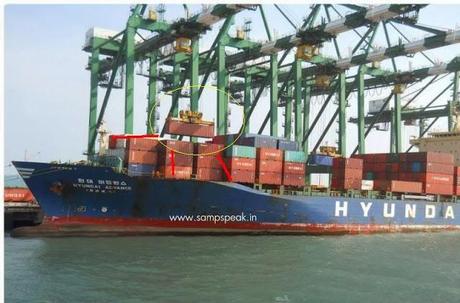One might be stumped by the reference ‘free’ ….. it is not the common free of cost that we assume - When used in trade terms, the word "free" means the seller has an obligation to deliver goods to a named place for transfer to a carrier. In this post, I have tried depicting the same through a photo which will make it easy to comprehend.
‘FOB’ is one of the most commonly known trade terms are Incoterms, which are published by the International Chamber of Commerce. The Inco terms when they were first adopted in 1936, were codified into 10 and FOB was one among them… some have lost their relevance over the decades and are no longer in vogue now. The Incoterms specify relationship between the Seller and buyer and none of the provisions affect, either directly or indirectly the relationship between the consignor and carrier as defined in the contract of carriage. Incoterms is no law either.
Under Inco 2000 : FOB was defined to mean that the seller delivers when the goods pass the ship’s rail at the named port of shipment. That would mean that the buyer has to bear all costs and risks of loss of or damage to the goods from that point. The FOB contract makes the obligation of the Seller to clear the goods for export. This is a term to be used when the mode of transportation is ‘Sea or inland water transport’ ~ though one commonly comes across this being used in other forms as well. If the contracting parties i.e., Seller and Buyer intend deliverance elsewhere and not across the ship’s rail – FCA term is preferred.
A reference to FOB in a sale contract / transportation involving containerized cargo where entrustment to a Carrier is at a ICD / CFS and that of bulk cargo is fraught with legal complications. In common parlance, the obligations of the Seller can be summed as :ü Provision of goods in conformity with the contractü Obtaining licences, authorizations and formalities for exportü Delivering the goods on the date at the named port of shipment on board the vessel nominated by the buyerü In this contract, the seller bears risks of loss of or damage to the goods until such time they have passed the ship’s rail at the named port of shipment and the seller has no obligation towards contract of carriage and contract of insurance for the overseas transit.
In this and similar type of contracts – the Seller need not arrange for Insurance and such policies are not assignable. Under the Incoterms 2010 standard published by the International Chamber of Commerce, FOB stands for "Free On Board", and is always used in conjunction with a port of loading.Indicating "FOB port" means that the seller pays for transportation of the goods to the port of shipment, plus loading costs. The buyer pays cost of marine freighttransport, insurance, unloading, and transportation from the arrival port to the final destination. The passing of risks occurs when the goods are loaded on board at the port of shipment. So it is no longer “passing ship’s rail” … but now on board the nominated vessel. Incoterms apply primarily to international trade, not domestic trade within a given country.
Other than the terms of sale [Incoterm] – in Marine Insurance parlance, reference to FOB is made in :1) Basis of Valuation ….. [FOB + … %] … if this were to be the basis of valuation i.e., fixing of Sum Insured, then premium will be charged on the Invoice value when it is on FOB terms and in any case would not include – Freight, Insurance or any other incidental expenses… the claim settlement [the measure of indemnity] would also follow similarly and would be restricted to the same components that went into the Sum Insured.
2) Policies issued covering inland transit alone – can have reference to ‘FOB’ clause….. more of this later on a subsequent post.
In the photo above, it is containers which are placed on board a waiting vessel in Port of origin. One can see the portainer handling and about to place a container on board the vessel…. this literally is the FOB point – placing goods on board of the vessel – which becomes the dividing point of obligation between the Seller and buyer in a FOB contract.
Look forward to hearing the views of experts in the field… Marine is always interesting !With regards – S. Sampathkumar
17th Nov. 2013.
